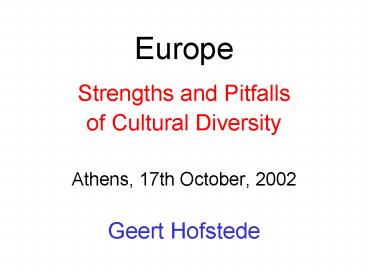Europe PowerPoint PPT Presentation
1 / 18
Title: Europe
1
Europe
- Strengths and Pitfalls
- of Cultural Diversity
- Athens, 17th October, 2002
- Geert Hofstede
2
CULTURE in the anthropological sense
- Collective programming of the mind
distinguishing the members of one group or
category of people from another - group/category can be nation, organization,
department, occupation, gender, generation
3
Manifestations of culture
4
The learning of culture
5
National versus organizational cultures
- National culture differences are rooted in
values learned before age 10 - They pass from generation to generation
- For organizations, they are given facts
- Organizational cultures are rooted in practices
learned on the job - Given enough management attention, they can be
changed
6
National and organizational cultures are
different things
- National cultures belong to anthropology. They
distinguish ways of thinking, feeling, and acting
of similar people across nations - Organizational cultures belong to sociology. They
distinguish ways of acting of people across
organizations within one nation
7
5 dimensions of national cultures
- Inequality more or less? Power Distance large
vs. small - The unfamiliar fight or tolerate? Uncertainty
Avoidance strong vs. weak - Relation with in-group loose or tight?
Individualism vs. Collectivism - Emotional gender roles different or same?
Masculinity vs. Femininity - Need gratification later or now? Long vs.
Short term orientation
8
Six dimensions of organizational cultures
- Process Oriented or Results Oriented?
- Employee Oriented or Job Oriented?
- Parochial or Professional?
- Open System or Closed System?
- Loose Control or Tight Control?
- Normative or Pragmatic?
9
National culture scores for gt 50 countries based
on comparing IBM subsidiaries around 1970
- So far 6 major replications on other
populations (elites, other corporations, airline
pilots, consumers, civil servants) - Results very stable even if cultures shift,
countries shift together so relative scores
remain valid - Over 400 significant correlations with other
national measures
10
Neglected important dimension for Human Resources
Management Masculinity vs. Femininity
- Masculinity A society in which gender values are
distinct Men are supposed to be assertive, tough
and focused on material success, women on the
quality of life - Femininity A society in which gender values
overlap Both men and women are supposed to be
modest, tender, and focused on the quality of life
11
- Masculinity
- Money and things
- Live in order to work
- Humans are resources
- Manager as hero
- Manège model
- Oversell yourself
- Job prevails over family life
- Conflicts resolved by fighting
- Femininity
- People and quality
- Work in order to live
- Work makes people
- Manager as worker
- Ménage model
- Undersell yourself
- Job takes family life into account
- Conflicts resolved by compromise
12
MAS index scores for European countries
- Masculine
- Slovakia
- Hungary
- Austria
- Italy
- Switzerland
- Ireland
- Great Britain
- Germany
- Poland
- (U.S.A.)
- Greece
- Czechia
- Belgium
- Luxembourg
- Turkey
- France
- Spain
- Romania
- Bulgaria
- Russia
- Portugal
- Estonia
- Finland
- Slovenia
- Denmark
- Netherlands
- Norway
- Sweden
- Feminine
13
MAS index scores by gender
14
Values are in our guts, not in our minds
- Cultural differences are no fun if they
dont make you angry you havent understood them
yet .... Like why do they hate us so much? - Simplistic classifications attribute all
differences to Ind/Col ..... and as individualist
cultures are wealthier, arent they better? - Culture is not another trick towards profits
its about being human. - The other dimensions are just as crucial
15
Culture Change
- Being rooted in values learned before age 10,
national culture differences are quite stable and
pass from generation to generation - Neither politicians nor priests can change them,
let alone CEOs - What leaders can try to change is organizational
practices and identities - The EU and multinationals are not kept together
by shared values but by practices
16
- Available in 17 languages
- Bulgarian, Chinese,
- Czech, Danish,
- Dutch, English,
- Finnish, French,
- German, Japanese,
- Korean, Norwegian,
- Polish, Portuguese,
- Romanian, Spanish,
- Swedish
- Older book in Italian
- Details on website www.geerthofstede.nl
17
(No Transcript)
18
(No Transcript)

